Ask someone walking down the street of any major global city what images come to mind when they hear the word “Korea” and many will likely describe images from the south such as K-pop groups like BTS, Korean foods, or K-dramas. From the north, they might reference the “hermit kingdom”, military parades, or missile tests. In recent years, these caricatures of the Koreas have reached wider and wider audiences.
AFSC’s relationship with people on both parts of the peninsula extends back before many of these contemporary associations developed. This year marks the 30th anniversary of AFSC’s Korea International Affairs Program. As we commemorate this milestone, we reflect on the history of those relationships and the legacy of AFSC’s work in Korea:
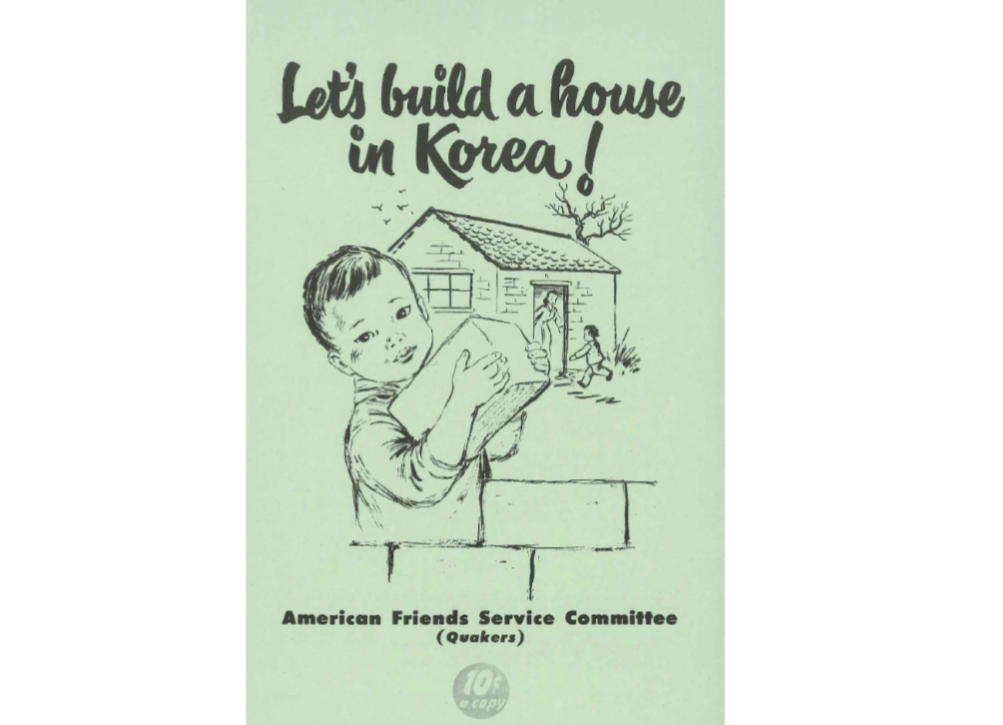
Cover of a 1955 AFSC educational pamphlet describing how Korean homes are made.
1950-1960: Responding to the Korean War and its aftermath
Following the outbreak of the Korean War in 1950—a conflict that divided families and displaced millions across the peninsula—AFSC sought ways to provide humanitarian assistance to people on both sides of the conflict. Guided by the Quaker belief in the divine light of each person, AFSC has worked with people from all sides of conflict to challenge unjust systems and promote lasting peace. However, during the war, due to access restrictions and legal limitations, AFSC was unable to find ways to provide assistance to those in the north. In the south, AFSC partnered with Friends Service Council in London to operate a health services program from 1952 to 1958. This work included educational and social services, such as distributing food and clothing and assisting in the reconstruction of homes.
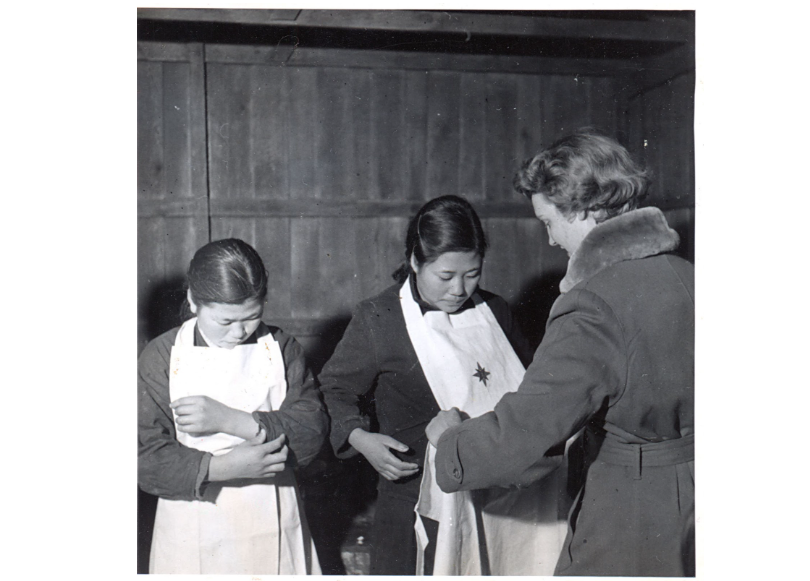
1953 AFSC Volunteer milk distribution in South Korea.
During the 1960s, AFSC continued to engage with the south out of the office in Tokyo. We organized international workcamps for youth in partnership with the Seoul Monthly Meeting. Youth worked with community members to rebuild what the war had destroyed. These efforts by the youth helped foster peace, understanding, and community development in Korea.
1970-1990: Bridging divides on the Korean Peninsula
From 1977 to 1980, AFSC staff based in Tokyo made frequent visits to South Korea to explore ways to continue the work in Korea. From the mid-1970s, AFSC staff began to make contact with representatives of North Korea in Tokyo and New York. These relationships resulted in an AFSC delegation visit to the Democratic People’s Republic of Korea (DPRK) / North Korea in the fall of 1980. This was the first delegation by a U.S. humanitarian organization to the north since the Korean War.
Between 1980 and 1993, AFSC conducted a total of five goodwill delegations to the DPRK, including a delegation with the AFSC executive director in 1988. Upon returning from their visit, each of these delegates shared their experience with policymakers and audiences in the U.S. to advocate for improved U.S.-DPRK relations. AFSC’s commitment to building relationships on all sides of conflict enabled the organization to be one of the few organizations to take such bold and courageous action during a period of transition in the region.
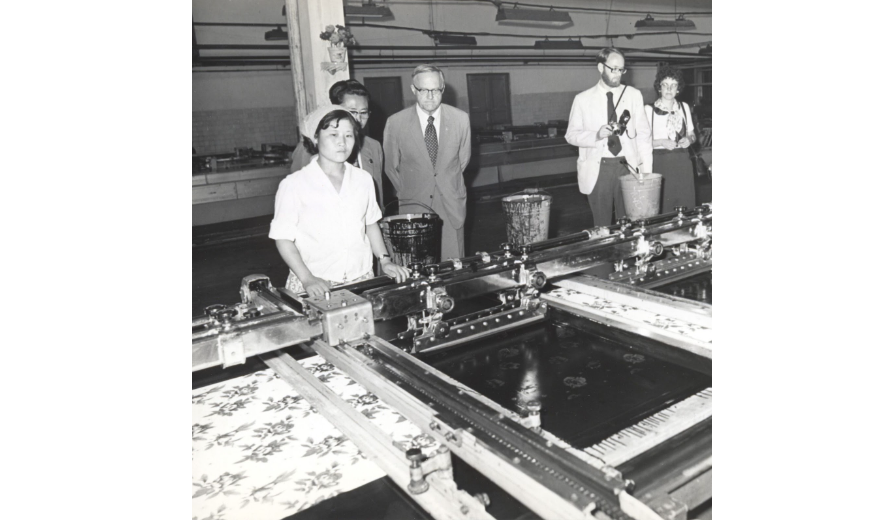
1980 AFSC delegation visiting a Pyongyang Textile Complex.
During the early 1990s, relationships between countries in the region began to shift. Notably, the Soviet Union and China, two major allies of DPRK, entered into commercial and diplomatic relations with South Korea. DPRK and Japan also held initial talks to discuss normalization of diplomatic relations, and the two Koreas signed an accord to reduce hostilities and increase exchanges.
These shifts led AFSC to evaluate whether its role in Korea had come to an end or whether these changes presented new opportunities to support peace. In 1991, following delegations from the DPRK to Philadelphia, two AFSC delegates visited both Koreas to talk with partners about what role AFSC could have under these changing dynamics. Conversations during these visits led to an expansion of the AFSC program in Korea.
AFSC’s Korea International Affairs Program was established in 1994. This program began with two goals: creating opportunities for dialogue and increased understanding between the U.S. and the DPRK through people-to-people exchanges, and strengthening regional dialogue between the DPRK and its neighbors.
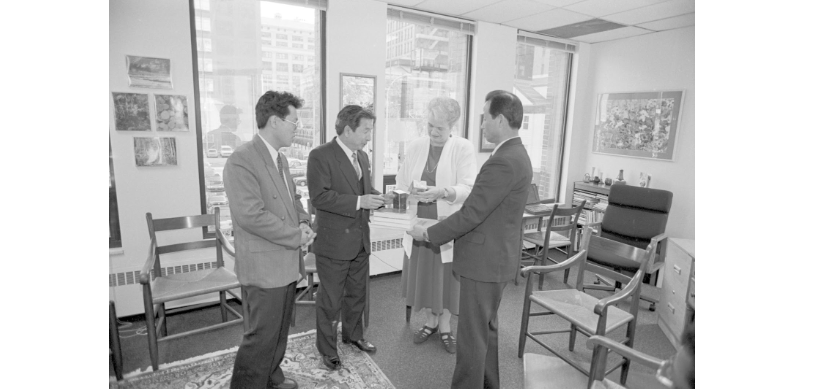
North Korean delegation visiting Friends Center Philadelphia in 1995.
1990-2000: A new focus on agricultural assistance
During the famine in 1995, at the request of DPRK partners, AFSC was again among the first organizations to take decisive action by calling for humanitarian assistance and providing funds to buy rice. In 1997, the program expanded to work directly with farmers in the north to help them increase their food production.
One of the first partnerships came after AFSC visited Sambong Cooperative Farm, a 2,300-hectare farm made up of 2,500 people in 550 households. Similar to many farms in DPRK at the time, Sambong’s harvest had decreased by over 60% following the flooding in 1995. The farm had been distributed a limited amount of fertilizer in 1997, which would further limit the harvest that season. Sambong requested that AFSC provide an additional 500 tons of fertilizer that would enable the farmers to increase their harvest by three to four tons. AFSC was able to return to Sambong Farm several weeks later with a shipment of 480 tons of fertilizer. This partnership with the community at Sambong Farm was the beginning of relationships with cooperative farms that AFSC would maintain for the next 20 years.
In the late 1990s, as the humanitarian situation stabilized in the years following the famine, AFSC shifted its focus from providing direct aid to supporting the efforts of its DPRK partners in agricultural improvement. Collaborating with the North Korean Academy of Agricultural Science (AAS), AFSC facilitated opportunities for knowledge exchange, enabling DPRK scientists to explore new fertilizing techniques and sustainable farming practices. In 1999, AFSC invited a delegation of three DPRK scientists to the U.S. to study corn, rice, and soybean production, while another group traveled to China to examine potato seeds. These study tours, along with subsequent visits by agricultural experts from the U.S., Vietnam, and China, provided DPRK scientists with valuable insights.
It was the DPRK agricultural teams themselves who adapted and applied these insights, deciding to focus on potato production and other strategies based on their own assessments of local needs. As former Quaker International Affairs Representative Edward Reed explained, these exchanges were designed to empower DPRK farmers and scientists to enhance their agricultural capacity, improve living standards, and move toward sustainable development in ways that align with their unique context and ambitions.
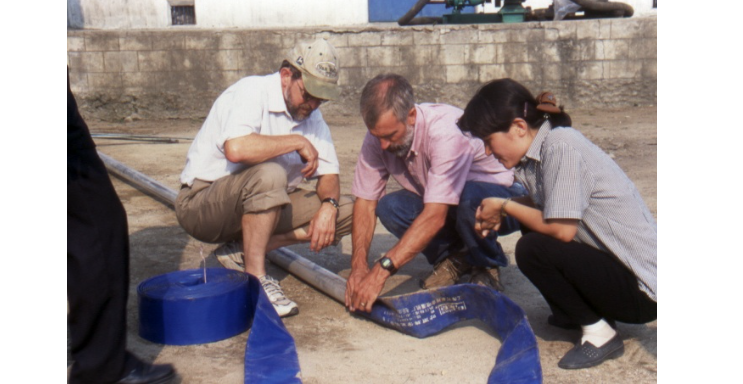
2003 visit by AFSC staff to four communal farms supported by AFSC’s DPRK Program.
2000-2010: Deepening mutual understanding and exchanges
In the early 2000s, AFSC continued creating opportunities for dialogue and knowledge exchange, facilitating several collaborations between North Korean scientists from AAS and Cornell University. These exchanges enabled DPRK scientists to introduce cold-tolerant apple, grape, and strawberry varieties, as well as implement improved pest management strategies. This directly enhanced agricultural productivity for farmers while fostering mutual understanding and collaboration between scientists from the U.S. and DPRK.
By 2008, DPRK scientists, with AFSC’s support, advanced their agricultural program by focusing on sustainable practices such as crop rotation and soil health management. DPRK farmers, recognizing the long-term benefits, began integrating soybeans, diversifying crops, and utilizing green manures to improve soil quality. Although there was initial resistance due to government quotas, the DPRK agricultural teams ultimately drove the shift towards sustainable practices, leading to a significant rise in soybean production, which reached 8% of the annual crop area. These efforts improved soil fertility, reduced reliance on chemical fertilizers, and enhanced agricultural sustainability in North Korea, all contributing to increased food security amidst environmental challenges.
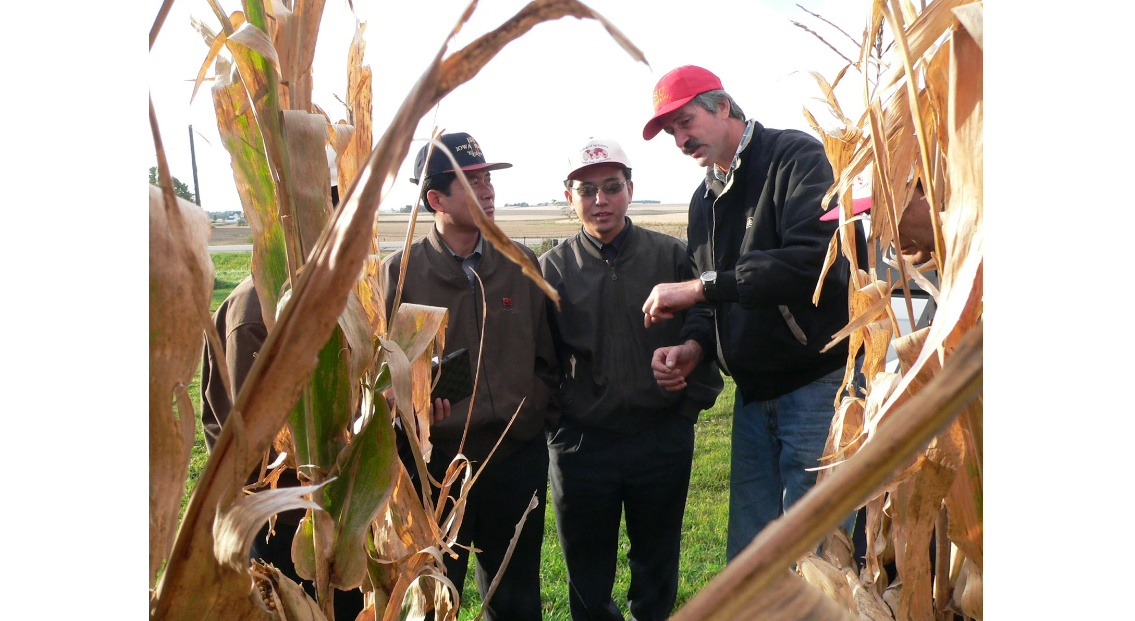
2006 AFSC delegation looking at an organic corn field in the DPRK.
In 2011, AFSC introduced greenhouse management techniques in partnership with the AAS, enabling farmers to extend their growing seasons and boost their vegetable production. By 2013, farmers expanded their agricultural efforts by integrating plastic tray seedling cultivation, a method learned during an exchange delegation to China. Through these exchanges with cooperative farms, AFSC has helped farmers access technology and methodologies to increase rice production by 10-20%, leading to its widespread adoption across cooperative farms.
2010-2020: Continued support for exchange and engagement
As relations between the U.S. and DPRK became more tense in 2016, AFSC published a series of reports emphasizing the feasibility and importance of people-to-people exchanges. By 2021, following DPRK’s sixth nuclear test, then-President Donald Trump’s comment of “fire and fury”, and a series of summits, AFSC continued to advocate for better U.S. policy toward the DPRK, while seeking ways to continue working with the collective farms.
Throughout the decades, AFSC’s dedication to people-to-people exchanges, pragmatic agricultural partnerships, and bold advocacy have underscored our unwavering commitment to fostering sustainable peace, community development, and mutual understanding.
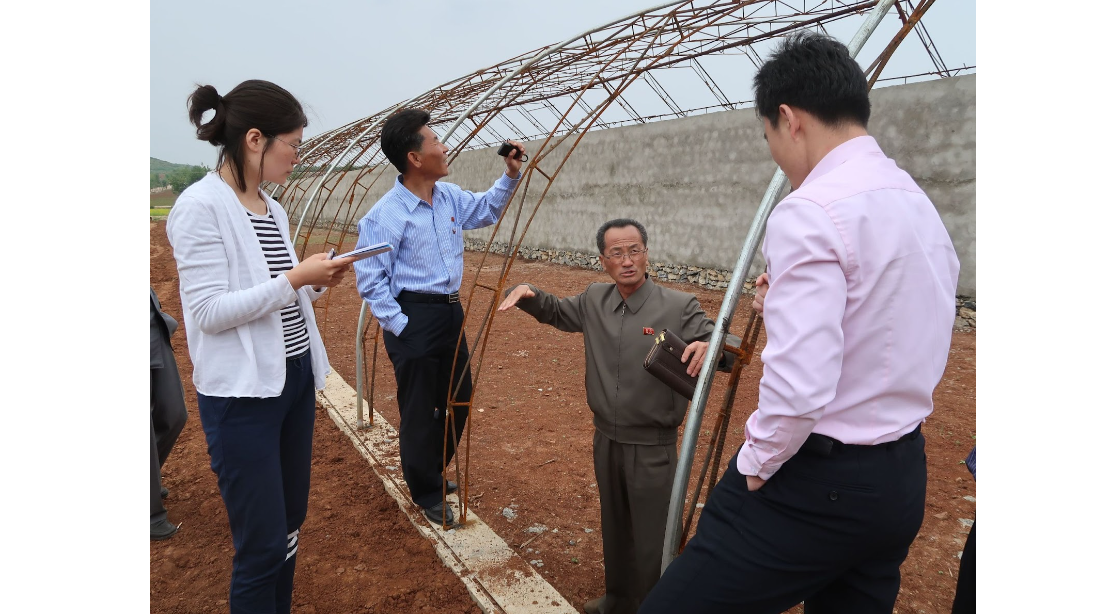
2018 visit to a cooperative farm greenhouse with DPRK partners.
Ongoing advocacy for peace in Korea
Today, we again find ourselves at a point of high-risk stalemate in U.S.-DPRK relations. In this moment, AFSC continues to work for a just, peaceful, and sustainable world as one of the few organizations taking courageous action calling for peace and humanitarian engagement with the DPRK. During the seven decades since AFSC first established partnerships to provide health and social services during the Korean War, through the three decades since the creation of the Korea International Affairs Program, and up until today, AFSC’s work has continued to be driven by the Quaker belief in the divine light of each person and the conviction that it is possible to work with all sides of a conflict.